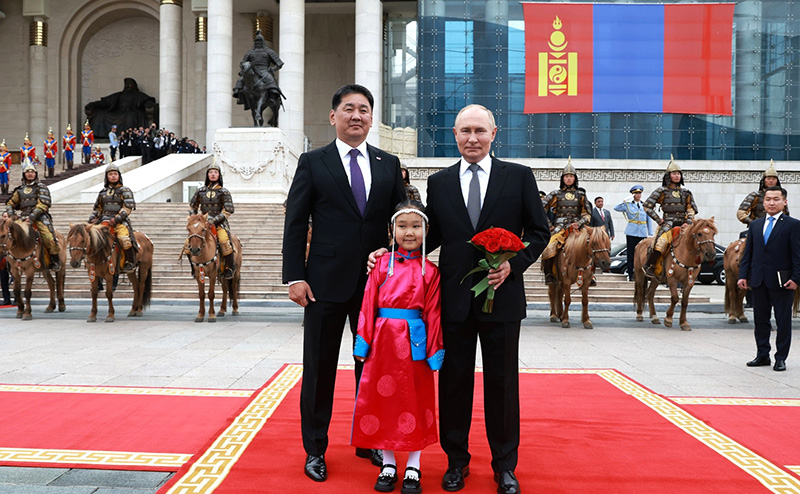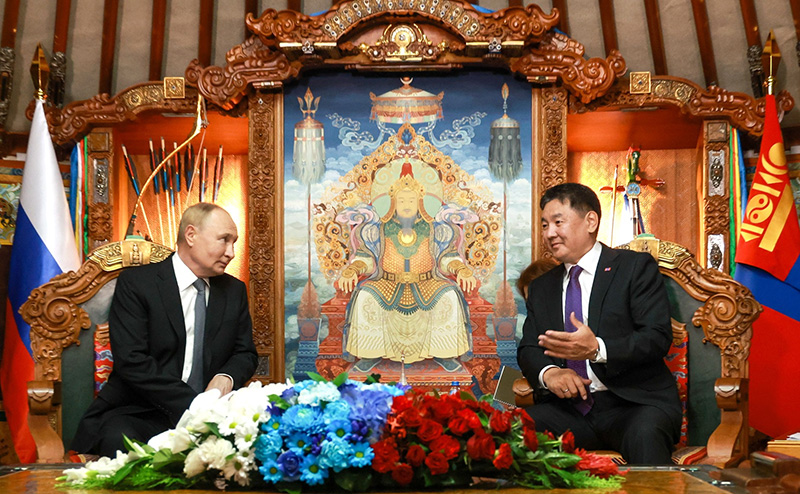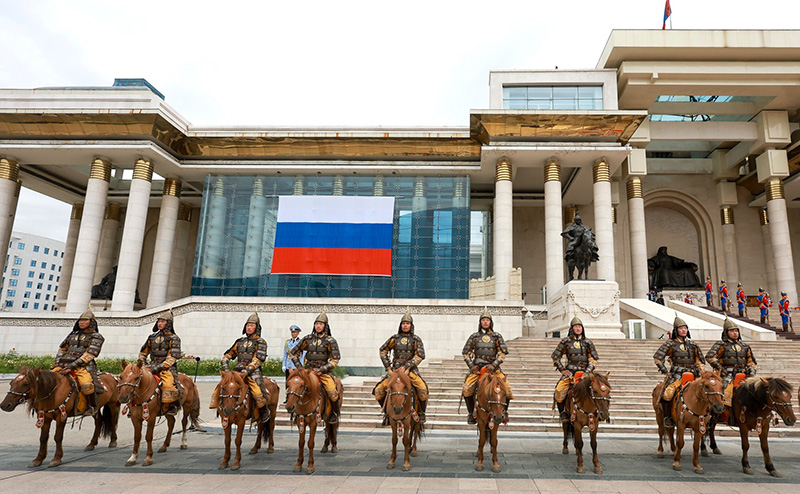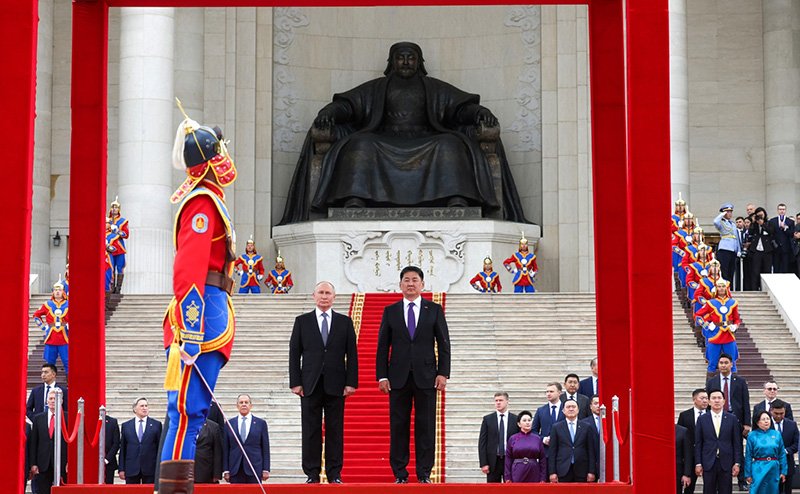 Russian President Vladimir Putin with Mongolian President Ukhnaagiin Khurelsukh.
Russian President Vladimir Putin with Mongolian President Ukhnaagiin Khurelsukh.
Photo: Kremlin.ru
The Russian president is on an official visit to Mongolia. Ukhnaagiin Khurelsukh invited Putin to visit the country in October 2023 during talks in Beijing. The last time the Russian leader visited Mongolia was in 2019. Putin then took part in the commemorative events dedicated to the 80th anniversary of the Battles of Khalkhin Gol.
Russia and Mongolia hold similar positions on a number of world affairs, Russian President Vladimir Putin said after talks with his Mongolian counterpart Ukhnaagiin Khurelsukh, TASS informs.
"Our discussion of the international agenda has confirmed that the positions of Russia and Mongolia on many global subjects are similar. The program of our interaction continues," the head of state said.
He noted that Russian-Mongolian cooperation in the defense and counterterrorism spheres contributes to ensuring security in Asia.
The president added that Mongolian people are taught Russian from an early age, and this opens up broad opportunities for deepening business, scientific and cultural ties between the countries. "The Russian side will continue to support the study of the Russian language in Mongolia, including in the regions bordering our country," Putin noted.
"I am very pleased to be in Mongolia, which is friendly to us, and together with the Mongolian people to celebrate a landmark event - our common victories on the Khalkhin-Gol River," Putin said.
The Russian president noted that Mongolia "turned out to be a very loyal, reliable ally of the Soviet Union and Russia" in the fight against Nazism and militarism.
"For decades, Russia and Mongolia have maintained very close, friendly relations," Putin stated. "Today these relations are developing successfully."
The Russian leader pointed out that Moscow attached great importance to interaction through parliaments.
"In today's world, this is a significant contribution to the development of contacts between the executive authorities," Putin concluded.
Russian President Vladimir Putin has invited his Mongolian counterpart Ukhnaagiin Khurelsukh to the BRICS summit to be held in Kazan this October.
 Photo: Kremlin.ru
Photo: Kremlin.ru
Russian President Vladimir Putin has announced a notable increase in trade turnover with Mongolia, with dollars and euros almost not used in payments.
"Russia is one of Mongolia’s key international economic partners. In the first seven months of this year trade turnover gained over 21%," Putin said following talks with his Mongolian counterpart Ukhnaagiin Khurelsukh.
"Trade payments between the two countries are almost fully made in currencies alternative to the dollar and the euro," he said.
The relations between Moscow and Ulaanbaatar "are developing dynamically and strengthening in full accordance with the interstate agreement on comprehensive strategic partnership signed five years ago," Putin noted. He also paid attention to the fact that "a wide range of issues of cooperation in the political, economic and humanitarian fields" was considered, with heads of countries "sharing views on the most relevant international and regional issues." "Further [to the meeting] a number of bilateral agreements were made," the president said.
"Much attention was paid to boosting mutually beneficial trade and investment ties" at the talks, he noted. "Building close ties between Mongolia and the Eurasian Economic Union would facilitate further growth of mutual export and import operations," Putin said, adding that "Russia supported the idea of a trade agreement between Mongolia and the EAEU to be concluded."
 Photo: Kremlin.ru
Photo: Kremlin.ru
"I would like to invite you to Russia, to Kazan, where we will host the BRICS summit this year. It will be the first event of this level after the expansion of this organization. I hope you will take part in the BRICS Plus format. We look forward to seeing you," Putin said at the start of talks with his Mongolian counterpart in Ulaanbaatar.
He also suggested to Ukhnaagiin Khurelsukh that they discuss cooperation between Russia and Mongolia in various spheres, in particular, in economy.
The gas pipeline project, which will run from Russia to China via Mongolia, is currently undergoing state expert examination, Russian President Vladimir Putin said after talks with his Mongolian counterpart Ukhnaagiin Khurelsukh.
"We see good prospects for cooperation in the gas sector. The design documentation for the Soyuz Vostok gas pipeline, almost a thousand kilometers long, which will connect Russia, Mongolia and China, has been completed. A state examination of the project is currently underway, and its impact on the environment is being assessed," Putin said.
He added that "it concerns not only the transit of Russian gas via Mongolia: the possibility of supplying this fuel to Mongolian consumers is also being considered."
"Gazprom is ready to provide the necessary support in practical matters of development of gas supply infrastructure of the country," the Russian leader assured.
In February 2022, Gazprom and the Mongolian government signed an agreement to carry out design and survey work as part of the Soyuz Vostok gas pipeline construction project. The design documentation was completed in December 2023. It will be an extension of the Russian Power of Siberia 2 pipeline and will allow the supply of up to 50 billion cubic meters of Russian gas per year to China. Its length across Mongolia will be 960 km. On the eve of the visit, Putin said in an interview with the Mongolian newspaper Onoodor that the possibility of using part of the transit gas to develop Mongolia's economy is currently being considered.
Relations with Mongolia have the priority for Russia and the countries now face the task of diversifying them, Russian President Vladimir Putin said at the meeting with Prime Minister of Mongolia Luvsannamsrain Oyun-Erdene.
"Relations with Mongolia are among priority ones," the Russian President said. "We value the attention paid personally by you and by the government of Mongolia to their consistent strengthening," Putin noted.
"The main task is to diversify our economic ties," the Russian leader said. "We have good opportunities to develop cooperation," Putin added. "We will also support further development of interregional communications," he stressed.
 Photo: Kremlin.ru
Photo: Kremlin.ru
Defense cooperation between Russia and Mongolia includes weapons supplies to Ulaanbaatar and troop training, Russian Deputy Defense Minister Alexey Fomin told reporters.
"We maintain defense and military cooperation," he said ahead of expanded talks between the two countries’ delegations. "We train troops. This year, we provided training to over 340 service members," Fomin noted, adding that the Presidential Cadet Academy in Kyzyl, the capital of Russia’s Siberian region of Tuva, was one of the facilities used for training troops.
According to Fomin, other fields of defense cooperation include "weapons and military equipment supplies, as well as repair, maintenance and upgrading services." "This is what we provide them with," he specified.
Asked if Russia would train Mongolian pilots on the US-made F-16 fighter jets that could be seized in the course of its special military operation, Fomin stressed: "Our aircraft are the best in the world." He added, with an ironic smile, that Russia could train Mongolian pilots "to shoot them (the F-16s) down later on."
The Mongolian side is considering the possibility of operating the small-capacity nuclear power plant, which Russian nuclear state corporation Rosatom will build in Mongolia, by Russian specialists, Rosatom CEO Alexey Likhachev said in an interview with the Rossiya-24 TV channel.
"Multi-level negotiations were held with Monatom, with the Energy Ministry. The key issue is, of course, personnel. <…> Our Mongolian friends are considering the possibility that at the first stage this plant will be operated by a Russian entity," he said.
The CEO of the state corporation recalled that the roadmap for the creation of the small NPP in Mongolia was signed in the spring at the Atomexpo forum. According to him, the Mongolian side needs a capacity of 220-330 MW. The plant, the project of which has been practically approved, is supposed to be built in the new capital of Novy Kharkhorum, Likhachev said.
 Photo: Kremlin.ru
Photo: Kremlin.ru
Officials of the International Criminal Court (ICC) should think twice before executing the arrest warrant against Russian President Vladimir Putin, Security Council Deputy Chairman Dmitry Medvedev said.
Commenting on the EU’s statement regarding Putin’s visit to Mongolia, which is an ICC signatory, he said: "The Mongolians have ignored the ICC and the European politicians." "If I were a judge or prosecutor of this so-called court, I would be afraid that some fool would carry out their illegal order. In that case, their lives would be worth no more than that <…> piece of paper," Medvedev wrote on his Telegram channel.
read more in our Telegram-channel https://t.me/The_International_Affairs

 11:53 04.09.2024 •
11:53 04.09.2024 •






















